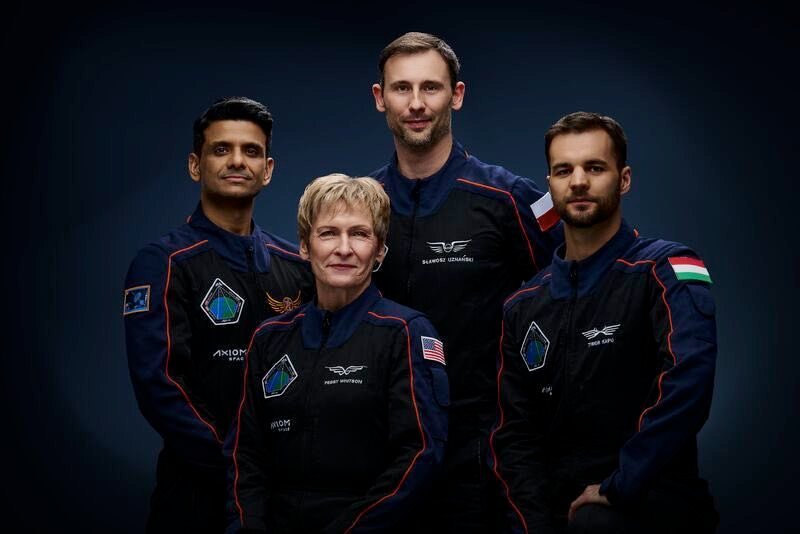Cape Canaveral, Florida – June 25, 2025:
Group Captain Shubhanshu Shukla of the Indian Air Force has etched his name in history by becoming the first Indian astronaut to journey to the International Space Station (ISS). The Axiom Mission 4 (Ax-4), launched successfully aboard a SpaceX Falcon 9 rocket from NASA’s Kennedy Space Center at 12:01 p.m. EDT on June 25, commenced a 28-hour flight to the orbiting laboratory.
Shukla, serving as the mission pilot, is accompanied by three international crewmates—Commander Peggy Whitson from the United States, Mission Specialist Sławosz Uznański-Wiśniewski of Poland, and Mission Specialist Tibor Kapu of Hungary. The crew is scheduled to dock with the ISS at approximately 7:00 a.m. EDT (4:30 p.m. IST) on June 26.
https://x.com/SpaceX/status/1937761020602384890
A Historic Milestone for India in Human Spaceflight
Group Captain Shukla’s journey marks a significant milestone for India, as he becomes the first Indian to travel to space since Wing Commander Rakesh Sharma flew aboard the Soviet Soyuz T-11 spacecraft in 1984. This mission symbolizes a resurgence of India’s human spaceflight aspirations and strengthens global collaboration in space exploration.
Shukla’s inclusion in the mission is seen as a stepping stone toward India’s upcoming Gaganyaan human spaceflight program, scheduled for launch in the coming years.
Mission Details and Launch Highlights
The launch occurred from the iconic Launch Complex 39A at NASA’s Kennedy Space Center. Approximately 10 minutes after liftoff, the Dragon spacecraft separated from the rocket’s second stage and initiated its nosecone deployment sequence, beginning its approach to the ISS.
The mission had faced several delays, originally targeting a May 29 launch. Challenges such as electrical harness observations in the Crew Dragon module, readiness issues with the Falcon 9 rocket, adverse weather conditions, a liquid oxygen leak, and a malfunction in the ISS’s Russian Zvezda module led to multiple reschedulings. The crew entered a strict quarantine protocol on May 25 to ensure mission safety and health standards.
14 Days of Science, Outreach, and International Collaboration
Once aboard the ISS, the Ax-4 crew will engage in a wide range of activities for up to 14 days. The mission includes over 60 scientific experiments and projects representing 31 countries, including India, the U.S., Poland, Hungary, Brazil, Saudi Arabia, Nigeria, UAE, and multiple European nations.
India’s contribution is notable, with the Indian Space Research Organisation (ISRO) having selected seven microgravity experiments designed by principal investigators from national research laboratories and academic institutions. Shukla will lead these experiments, focusing on biology, materials science, and fluid dynamics under microgravity conditions.
Additionally, ISRO and NASA will jointly conduct five collaborative science investigations and two in-orbit STEM (Science, Technology, Engineering, and Mathematics) education demonstrations. These initiatives aim to inspire the next generation of scientists and engineers while strengthening Indo-U.S. space cooperation.
Global Crew Led by a Veteran Astronaut
Commanding the Ax-4 mission is Peggy Whitson, a former NASA astronaut and the first woman to command the ISS. Whitson brings extensive experience, having spent over 665 days in space. Her leadership is instrumental in coordinating the international crew and ensuring the success of Ax-4’s scientific and outreach goals.
Sławosz Uznański-Wiśniewski and Tibor Kapu, representing Poland and Hungary respectively, also bring their nations into the fold of human space exploration through commercial partnerships with Axiom Space.
The Road Ahead
With the docking scheduled for the morning of June 26, the crew will begin their tightly packed schedule aboard the ISS. The mission’s outcome could shape the future of private and international collaboration in space.
As Group Captain Shukla takes India’s presence to new orbital heights, the Ax-4 mission is not just a scientific venture—it is a statement of aspiration, cooperation, and progress in the modern space age.








